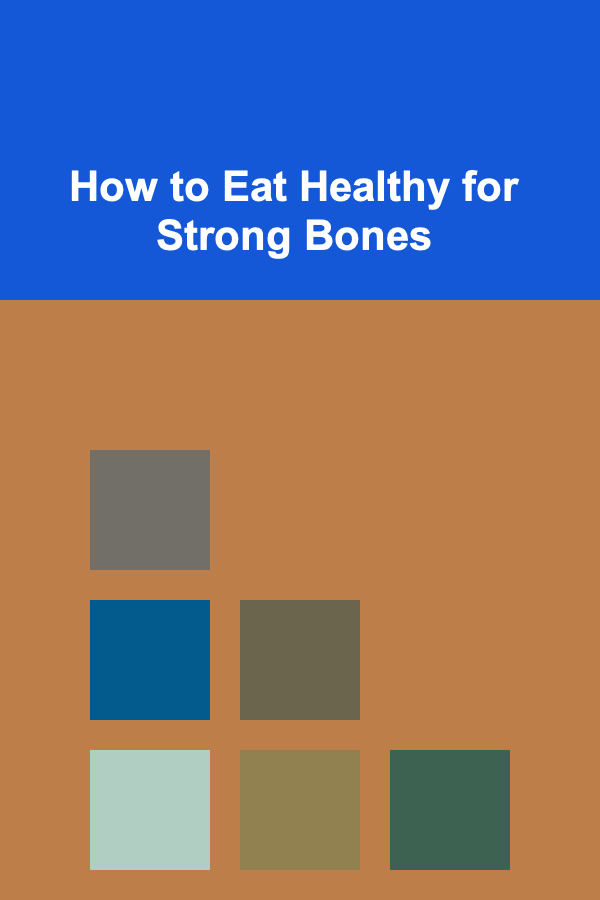
How to Eat Healthy for Strong Bones
ebook include PDF & Audio bundle (Micro Guide)
$12.99$9.99
Limited Time Offer! Order within the next:

Maintaining healthy bones is vital to overall health, as they are the framework of our body, supporting us through daily activities and protecting vital organs. Bone health becomes especially important as we age, but it's something that should be nurtured throughout life. While exercise and lifestyle choices play crucial roles in building and maintaining strong bones, the foundation of bone health starts with the food we eat.
This article will delve into the key nutrients essential for bone strength and how you can incorporate them into your daily diet. From calcium and vitamin D to magnesium and protein, understanding how these nutrients work together can make a huge difference in your bone health. Let's explore the science behind bone nutrition and how to adopt a bone-healthy diet.
The Importance of Bone Health
Your bones do more than just provide structure---they store vital minerals, help produce blood cells, and allow mobility. As we age, the process of bone breakdown accelerates, which can lead to conditions like osteoporosis, where bones become brittle and fragile. Osteoporosis is a significant risk, particularly for post-menopausal women, but it can affect anyone, regardless of age or gender.
Good bone health can reduce the risk of fractures, improve posture, and increase mobility. It can also help reduce the long-term risk of conditions such as arthritis, scoliosis, and even certain types of cancer that may impact the bones.
Essential Nutrients for Bone Health
To achieve optimal bone health, you need to ensure your body is receiving the right balance of nutrients. Let's explore the key nutrients that play an essential role in building and maintaining strong bones.
1. Calcium
Calcium is the most important nutrient when it comes to bone health. About 99% of the body's calcium is stored in the bones and teeth, and it plays a critical role in maintaining bone density and strength. It helps with the mineralization process, which is vital for the formation and growth of bones.
Sources of Calcium:
- Dairy Products: Milk, yogurt, and cheese are excellent sources of calcium.
- Leafy Greens: Kale, collard greens, and broccoli are high in calcium.
- Fortified Foods: Many plant-based milks (almond, soy, oat) and cereals are fortified with calcium.
- Fish with Bones: Canned salmon, sardines, and mackerel contain significant amounts of calcium.
How Much Calcium Do You Need?
The recommended daily intake of calcium varies depending on age, gender, and life stage:
- Adults (19-50 years): 1,000 mg per day
- Women 51-70 years: 1,200 mg per day
- Adults 71+ years: 1,200 mg per day
- Teens (14-18 years): 1,300 mg per day
2. Vitamin D
Vitamin D plays a crucial role in calcium absorption. Without sufficient vitamin D, your body cannot effectively absorb calcium, which compromises bone health. It also helps regulate the calcium and phosphorus balance in the body, promoting the maintenance of bone structure.
Sources of Vitamin D:
- Sunlight: The body can produce vitamin D when exposed to sunlight, so getting a little sun each day is beneficial for bone health.
- Fatty Fish: Salmon, tuna, and mackerel are excellent sources.
- Fortified Foods: Many dairy products, plant-based milks, and cereals are fortified with vitamin D.
- Egg Yolks: Eggs are a good source, although in smaller amounts compared to other sources.
How Much Vitamin D Do You Need?
The recommended daily intake of vitamin D depends on your age:
- Adults (19-70 years): 600 IU per day
- Adults 71+ years: 800 IU per day
- Infants (0-12 months): 400 IU per day
3. Magnesium
Magnesium is another important mineral for bone health. It helps regulate calcium levels in the blood and contributes to bone density. Magnesium works in tandem with calcium to strengthen bones and promote bone mineralization.
Sources of Magnesium:
- Leafy Greens: Spinach, Swiss chard, and kale are high in magnesium.
- Nuts and Seeds: Almonds, sunflower seeds, and pumpkin seeds are good sources.
- Whole Grains: Brown rice, quinoa, and oats provide magnesium.
- Legumes: Beans, lentils, and chickpeas are rich in magnesium.
How Much Magnesium Do You Need?
The recommended daily intake of magnesium varies:
- Men (19-30 years): 400 mg per day
- Women (19-30 years): 310 mg per day
- Adults (31+ years): Men 420 mg, Women 320 mg per day
4. Vitamin K2
Vitamin K2 is another nutrient that's important for bone health, as it helps regulate the protein osteocalcin, which is responsible for binding calcium to the bone matrix. Vitamin K2 works in combination with vitamin D to ensure that calcium is properly utilized in the bones rather than accumulating in the arteries.
Sources of Vitamin K2:
- Fermented Foods: Natto (fermented soybeans), sauerkraut, and kimchi.
- Animal Products: Chicken, beef liver, and egg yolks.
- Dairy: Cheese, especially hard cheeses like Gouda and Brie, are high in K2.
How Much Vitamin K2 Do You Need?
Although there are no established daily values for vitamin K2, a general recommendation is to aim for at least 100 mcg of K2 per day.
5. Protein
Protein is essential for bone health because it provides the building blocks necessary for the formation of bones. Collagen, which is a key component of bone tissue, is made up of protein. Sufficient protein intake supports bone density and helps prevent bone loss, especially in older adults.
Sources of Protein:
- Lean Meat and Poultry: Chicken, turkey, lean cuts of beef and pork.
- Fish and Seafood: Salmon, tuna, shrimp, and other seafood.
- Legumes: Beans, lentils, and chickpeas are great plant-based protein sources.
- Nuts and Seeds: Almonds, walnuts, and chia seeds provide protein and healthy fats.
How Much Protein Do You Need?
The recommended daily intake of protein varies based on age, sex, and activity level, but generally, the average adult requires about 0.8-1.2 grams of protein per kilogram of body weight.
6. Phosphorus
Phosphorus is the second most abundant mineral in the body, and it is found in every cell. Phosphorus works closely with calcium to build and maintain strong bones and teeth. About 85% of the phosphorus in your body is stored in your bones.
Sources of Phosphorus:
- Meat and Poultry: Chicken, turkey, and pork are rich in phosphorus.
- Fish and Seafood: Salmon, cod, and trout provide significant phosphorus.
- Dairy Products: Milk, cheese, and yogurt.
- Nuts and Seeds: Sunflower seeds, walnuts, and pumpkin seeds.
- Whole Grains: Oats, quinoa, and brown rice.
How Much Phosphorus Do You Need?
The recommended daily intake of phosphorus for adults is about 700 mg per day.
7. Boron
Boron is a trace mineral that plays a role in bone health by helping the body metabolize minerals such as calcium, magnesium, and vitamin D. Boron may also contribute to bone density by improving the way the body uses vitamin D.
Sources of Boron:
- Fruits: Apples, pears, grapes, and avocados are good sources of boron.
- Nuts and Seeds: Almonds, walnuts, and peanuts.
- Leafy Greens: Kale and spinach are high in boron.
- Legumes: Beans, lentils, and chickpeas.
How Much Boron Do You Need?
There is no official recommended daily intake for boron, but a typical intake is around 1-3 mg per day for adults.
Additional Lifestyle Factors for Bone Health
While diet plays a crucial role, other lifestyle factors also impact bone health. Regular exercise, particularly weight-bearing and strength-training activities, helps stimulate bone growth and improve bone density. Smoking and excessive alcohol consumption can weaken bones, so it's important to limit these behaviors for optimal bone health.
1. Exercise for Bone Health
- Weight-Bearing Activities: Activities like walking, running, hiking, and dancing help promote bone health by applying stress to the bones, which stimulates bone-building processes.
- Strength Training: Lifting weights or using resistance bands can help improve bone strength by building muscle, which in turn supports the bones.
- Balance and Flexibility: Yoga and Pilates can help improve balance, reducing the risk of falls that could lead to fractures.
2. Sun Exposure for Vitamin D
Regular exposure to sunlight helps your body produce vitamin D naturally. Aim for 10-30 minutes of sunlight exposure on your face, arms, and legs several times a week, depending on your skin tone and location.
3. Limiting Alcohol and Avoiding Smoking
Excessive alcohol consumption and smoking have both been linked to decreased bone density. Limiting alcohol intake to moderate levels and quitting smoking can greatly improve bone health.
Conclusion
Eating for strong bones requires a balanced, nutrient-rich diet that includes adequate amounts of calcium, vitamin D, magnesium, and other essential minerals and vitamins. These nutrients work synergistically to support bone health, and making small changes to your diet can have a significant impact on your long-term bone strength.
Incorporate bone-healthy foods into your daily meals, engage in regular weight-bearing and strength-training exercises, and avoid harmful habits like smoking and excessive alcohol consumption. By focusing on these habits, you can maintain strong, healthy bones well into your later years.
Remember, the key to strong bones is consistency. Start making these small dietary and lifestyle changes today to build a healthier future.

How to Build and Sell AI Models for Passive Income
Read More
How to Host a Family Talent Show with Fun Prizes
Read More
How to Prevent Noise From Neighbors in Shared Walls
Read More
How to Use the FIFO Method (First In, First Out) in Your Pantry
Read More
How to Advocate for Climate Action at the International Level
Read More
How to Time Block for Studying Effectively
Read MoreOther Products

How to Build and Sell AI Models for Passive Income
Read More
How to Host a Family Talent Show with Fun Prizes
Read More
How to Prevent Noise From Neighbors in Shared Walls
Read More
How to Use the FIFO Method (First In, First Out) in Your Pantry
Read More
How to Advocate for Climate Action at the International Level
Read More